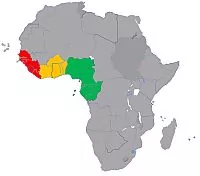Following keenly contested and closely watched parliamentary elections held in Cote d'Ivoire on 18th December, the Commission Electoral Independente (CEI), released official results on Tuesday 20th December. This was the first election since the 2010-11 violence that had a significant opposition involvement and, as such, would prove a stern test of the country's political institutions and inclusiveness.
- Final results (excluding one seat where there was a dead heat) have been declared in the parliamentary elections that were held in Cote d'Ivoire on 18th December. Voting was carried out in a largely peaceful and transparent manner although some reports of small clashes and attempted electoral fraud were reported by the main domestic observation group, Plateforme des Organisations de la Societe Civile pour l'Observation des Elections en Cote d'Ivoire (POECI). One negative outcome was the low turnout of 34.1% which is higher than was feared at one point but still lower than the 2011 legislative elections that saw a turnout of 36.58%
- As expected, the main Rassemblement des houphouetistes pour la democratie et la paix (RHDP) alliance won a very comfortable majority with 167 seats. Crucially, this is three seats short of having an absolute majority of two thirds. An absolute majority would have allowed the government to make constitutional amendments unopposed. The group making the biggest gains in these elections is the independent candidates. The independents have increased their tally from 35 seats in the last national assembly to 75.
- The largest disappointment of the elections came from the opposition Front Populaire Ivoirien (FPI) which was only able to attain three seats in the National Assembly. This is the first election since the end of the violence in 2011 that saw any significant opposition involvement (187 candidates fielded) so much was expected of the party. However, visibly, the FPI's internal struggles proved too much to inspire the electorate's confidence in it.
Outlook
These results are very positive for the short-medium term prospects of the country. Aside from any major violence and confrontations being averted, for all intents and purposes, the status quo has been maintained so we are unlikely to see any sweeping changes in either policy or personnel. During the campaign period, President Ouattara called for a strong majority for the ruling coalition to allow him to "accelerate the work that I have as a goal for the next four years". We can expect to see strong infrastructural development such as the US$ 110m "special plan" Ouattara announced for Abobo (north of Abidjan) earlier this month, particularly in government stronghold areas.
The allegiance of independent candidates could be a potential hindrance to the plans of the government. Many of the independent candidates are members of the UPCI (part of the broader RHDP alliance) who were not selected to represent the RHDP due to the imposition of candidates by the leading party in the coalition, Ouattara's Rassemblement des Republicains (RDR) party. If they toe the party line, however, the RHDP will secure its absolute majority. This is the most likely outcome given that MPs will need to collaborate closely with government to carry out development in their constituencies . With only three extra seats required, it is likely that the government will attain their two thirds majority.
While the holding of another peaceful and successful election is an achievement that must be lauded, a deeper look must be taken at the state of political participation in Cote d'Ivoire. In reality, the country only has one viable standalone party; the coalition member UPCI chalked up its successes only because of its affiliation to the RHDP and the FPI's divisions are crippling. This is leading to significant voter apathy, especially among the youth of the country who feel that a vote for any opposition party is instantly a wasted vote. Whilst speaking to a reporter from Jeune Afrique on election day, one potential voter said that he would "not waste his fuel and time for people that don't remember us other than during elections." A polling agent in Abobo also said "people are saying they don't have a stake and that the game is already over."
The content of this article is intended to provide a general guide to the subject matter. Specialist advice should be sought about your specific circumstances.

